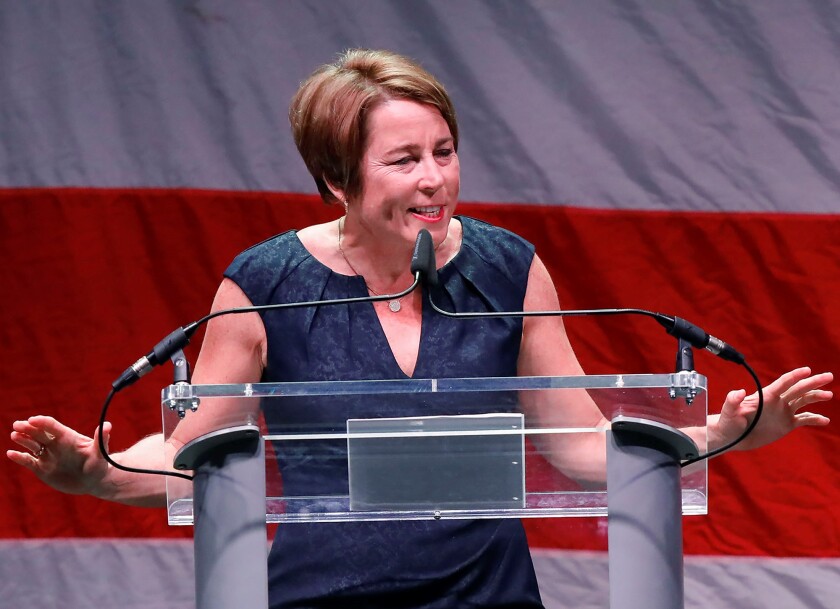It’s normal for the most competitive races to receive the most attention, but new governors are coming to power in one-party states as well. Their campaigns may have been snoozefests, but it’s important to know the newcomers who will serve as the top managers and power brokers in their states.
There are at least five people you could safely bet your rent money will be elected — the about-to-be incoming governors of Arkansas, Hawaii, Maryland, Massachusetts and Nebraska. Here, in that order, are profiles of all of them:
Sarah Huckabee Sanders, Arkansas (Republican)

Lukas Flippo/IndyStar
“Obviously, her dad being a former governor, who was popular and continues to be popular, added to it,” says Matthew Shepherd, speaker of the Arkansas House. “Unquestionably, the fact that she served at the national level and had a very high profile in the Trump administration, that’s something that people respected.”
Sanders had Trump’s endorsement from the get-go and her connections to national GOP fundraising networks brought in a gusher of money. Two other prominent Republicans who had their eye on the governor’s race — Lt. Gov. Tim Griffin and state Attorney General Leslie Rutledge — soon found other offices to pursue. Given Arkansas’ strong Republican tilt, there’s never been any real doubt about her ultimate victory.
She’ll represent some important firsts. Sanders will be the first Republican governor to succeed another one since Reconstruction. (Gov. Asa Hutchinson is term-limited). She’ll be the state’s first woman governor. And Arkansas, along with Massachusetts, will be the first of any states to have women serving together as governor and lieutenant governor.
But the question of what she intends to do in office remains a very real one. Her political advantages allowed her to run a relatively quiet campaign. She took time off this summer due to a cancer scare, although her prognosis is good following surgery to remove her thyroid in September. Sanders has been active in politics throughout her adult life, helping to run campaigns not only for her father but other prominent officeholders such as Sen. John Boozman. However, she has never held elective office herself.
Sanders will have plenty of money to play with. The state ended its last fiscal year with a $1.6 billion surplus and revenues continue to come in much higher than last year. She’s made clear that she intends to make education one of her major priorities and will be a big supporter of parental rights. “Arkansas is the most pro-life state in America, but I believe we must now become the most pro-adoption state by improving the state foster care system … and supporting parents who strive to help kids in one of their greatest moments of need,” she said this summer.
The big unknown will be what tone she takes in office. Arkansas governors have tended to be pragmatists. Her dad was known as a compassionate conservative, increasing health coverage for children and education spending. But he had to work with a Democratic Legislature, which his daughter will not. Huckabee has since shown a harder edge as both presidential candidate and Fox News commentator.
So will Sanders govern as her dad did then, or as he would now? At the podium in the Trump White House, she never backed down from any partisan fights. “I think there are likely to be some similarities between her style and her father’s style,” Speaker Shepherd says. “That’s to be expected, but the politics of the day are a lot different than they were 20 to 25 years ago.”
Josh Green, Hawaii (Democrat)

(Jamm Aquino/Honolulu Star-Advertiser via AP)
Polls conducted this year and last have shown Green enjoying an approval rating in the mid-60s. That gave him a formidable advantage over his main rivals for the Democratic nomination to succeed Gov. David Ige — Vicky Cayetano, the wife of former Gov. Ben Cayetano, and U.S. Rep. Kaiali’i Kahele. Green finished the August primary more than 40 percentage points ahead of Vicky Cayetano. “There was never much doubt in anyone’s minds from the earliest days of the campaign that he was going to win,” Moore says. “He was very good at managing his brand — the nice doctor who would take care of your family.”
Green, who still sometimes pulls shifts at a rural hospital, has made plenty of public appearances wearing scrubs. During his time in the Legislature, he was best known for working on health-related issues. Green chaired the state Senate Health Committee and sponsored Hawaii’s law raising the smoking age to 21 — a pioneering effort that was copied by 18 other states before becoming federal law. He also helped push through an insurance mandate for children on the autism spectrum known as Luke’s Law.
Green, who is 52, grew up in Pittsburgh. He came to Hawaii in 2000 as a member of the National Health Service Corps. In the Legislature, he was associated with progressives and his campaign had support from labor unions. As opposed to Ige, who played an “inside game,” devoting his time and attention to winning over legislators, Green is expected to make greater use of his bully pulpit to sway legislators by building public support for his causes.
He’s talked about creating a housing czar to address issues of affordability and intends to push agencies to move faster on issues such as increasing access to early childhood education. “While Green never showed an interest in building local political coalitions or leading specific issues such as Native Hawaiian reparations, he has shown skill as a political fundraiser and tactical election strategist,” says Richard Borreca, a political columnist with the Honolulu Star-Advertiser.
Wes Moore, Maryland (Democrat)

Jerry Jackson/TNS
Moore, who is 44, may not have previously run for office but he possesses a diamond-plated resume nonetheless. After winning a Rhodes scholarship, Moore enlisted in the Army following the Sept. 11, 2001, terrorist attacks, serving in Afghanistan and reaching the rank of captain. He worked on Wall Street as an investment banker before heading up the Robin Hood Foundation, a major anti-poverty organization in New York. Along the way, he’s been a White House fellow, bestselling author and television host. “Wes Moore’s exciting,” says Mileah Kromer, a pollster at Goucher College. “He’s going to be an instant star. There’s a charisma that isn’t just a charisma for political elites.”
Moore will be Maryland’s first African American governor and only the third elected to the position in the nation’s history (following Douglas Wilder of Virginia and Deval Patrick of Massachusetts). Moore won the Democratic nomination in July with just barely more than a third of the vote, outpacing a large field that included Tom Perez, a former state cabinet official and chair of the Democratic National Committee, and state Comptroller Peter Franchot.
Although Moore was a political outsider, he received support from a number of prominent elected officials, including the top leaders in the state House and Senate (not to mention celebrities such as Oprah Winfrey and Spike Lee). He has the sense to know he’s going to need allies. “We had so many talented people in the primary,” says state Del. Stephanie Smith. “We were fortunate to land on a person who has magnetism and charisma and treats everyone with respect.”
Moore succeeds term-limited Republican Larry Hogan. The GOP nominee, state Del. Dan Cox, is generally considered too Trumpy to win in deep-blue Maryland. During Hogan’s reign, Democratic supermajorities in the Legislature were routinely able to override his vetoes, so the change in the governor’s office may not lead to startling changes in policy. “Moore has broad-based appeal, because he doesn’t come off as an ideologue at all,” Kromer says. “You could not pigeonhole him into being just a progressive or just a moderate.”
Moore will work to address the state’s own workforce shortage, especially in areas such as probation and parole. He wants to focus on some of the less-sexy work of government, such as overhauling state procurement systems. He intends to help boost entrepreneurship among women and minorities, as well as implementing the massive overhaul of early childhood and K-12 education enacted last year. “This is by most standards a very wealthy state but it has a hard core of very poor people and I think those are going to be the objects of his earliest attention,” Crenson says. “In fact, he’s said as much.”
One clear break will be Baltimore. Hogan was no great friend to the city, killing a transit line soon after taking office. Moore has spent much of his life in the city and is raising his family there. The prospect of a friend of the city occupying the governor’s mansion excites Smith, who chairs the city’s state House delegation. “Being a military officer, he has the mantra of leave no one behind,” Smith says. “Wes feels very strong that government not only has an opportunity to see that the residents it serves are not left behind, but an obligation.”
Maura Healey, Massachusetts (Democrat)

Chris Christo/TNS
Maura Healey, the 51-year-old Democrat about to succeed Republican Gov. Charlie Baker, will have to navigate those waters. Democratic legislators will be delighted to work with someone from their own party, but they didn’t override Baker as habitually as Maryland Democrats overrode Hogan. “There’s a fair amount of ideological diversity in the state House and Charlie Baker gave them an excuse not to do some progressive things,” says Erin O’Brien, a political scientist at the University of Massachusetts Boston.
Healey established her bona fides as a liberal during her years as state attorney general. As co-chair of the Democratic Attorneys General Association, she established a policy to require that candidates had to support abortion rights to win the organization’s endorsement. She sued the Trump administration dozens of times, notably on education and environmental issues, as well as being the first state AG to sue the Sackler family directly over its role in the opioid crisis, winning a $4.3 billion settlement. “During the Trump administration, she had the fourth-highest number of lawsuits against the federal government, up there with the 800-lb. gorillas of California and New York,” says Paul Nolette, a Marquette University political scientist who studies state attorneys general.
Healey managed to clear the Democratic field for governor. Her election has not been in doubt, with Baker opting not to run for a third term and Republicans nominating former state Rep. Geoff Diehl, “a Trump-endorsed candidate in a Never Trump state,” as The Scope of Boston described him. Her lead has allowed her to be cautious on the campaign trail. With a 20-point lead, she had no need to crawl out on a policy ledge, O’Brien suggests.
It’s clear that she will govern from the left on issues such as making child care affordable, housing policy, climate and regional transportation. She sees all of those issues and more as intertwined as she prepares to cope with an economy that’s struggling in many parts of the commonwealth. She continually presented herself to voters as a manager. “It’s almost as if she ran as Charlie Baker 3.0,” says David Paleologos, a pollster at Suffolk University. “She mentioned Baker probably a dozen times in the last debate and really framed herself as somebody who will continue Baker’s policies on X and Y.”
Healey was an all-American basketball player in high school and played point guard at Harvard University. (Coincidentally, Baker played basketball for Harvard for one season.) Healey went on to play pro ball in Austria. She never seems to tire of talking about the values she learned from sports and their applicability to politics. “Sports were a salvation for me, especially when my parents split up,” she said in a 2018 interview. “That’s what really taught me the lessons that I still carry with me today about hard work, discipline, how to win, how to lose and come back from failure.”
Healey’s background in sports helped her broaden her appeal in a way that previous unsuccessful women candidates for the office, Martha Coakley and Shannon O’Brien, were unable to do. Healey will not only be the first woman governor of Massachusetts, but looks likely to lead in a total of five women in six of the constitutional offices. “When it comes to working with the Legislature, she’ll do what needs to be done to get the job done,” Marsh says. “It’s all about teamwork. Her whole mentality in sports and politics is as a point guard. It’s not about points, but assists.”
Jim Pillen, Nebraska (Republican)

Kenneth Ferriera/AP
Pillen also had the crucial support of term-limited Gov. Pete Ricketts. Ricketts was no fan of Charles Herbster, a farmer and rancher who had Trump’s backing in the primary. Herbster faced allegations of groping from multiple women, including a state senator. Pillen ended up defeating Herbster narrowly in the GOP primary in May. “As the governor’s race evolved and some of the negative news stories came out, a number of voters were looking for someone to turn to,” says Randall Adkins, a political scientist at the University of Nebraska Omaha. “Pillen ended up emerging from the pack.”
Pillen may soon do Ricketts a huge favor in return. U.S. Sen. Ben Sasse will soon resign to lead the University of Florida and it’s quite possible the outgoing governor will want the appointment. However that drama plays out, Pillen is expected largely to follow in Ricketts’ footsteps in terms of the state’s policy course. “I really don’t expect to see much of a shift at all,” Adkins says. “He’s a very traditional conservative who will pursue very traditional policies.”
Pillen, a successful veterinarian and pig farmer, will turn 67 next month. He serves on the University of Nebraska Board of Regents, which is an elected position. Last year, he pushed a resolution to oppose teaching of critical race theory. Aside from that issue — and his opposition to abortion rights — he’s not expected to be as much of a culture warrior as some current governors, sticking to more traditional bread-and-butter concerns.
Education will be a prime focus, but he’ll devote much of his attention to changing the state’s tax structure. He’d like to shift education funding in a way that would lower property taxes. He’s also interested in limiting sales tax deductions. His package is not yet fully baked, but he’s expected to pursue a true overhaul of the tax code, as opposed to chipping away at rates or credits. “There have been some incremental things done in the last few years, but we’d like to see some more fundamental changes made,” says Jim Vokal, CEO of the Platte Institute, a conservative think tank in Omaha.
Pillen is about to join the ranks of governors who get elected after spending most of their careers in business. Some do well, while others wash out, since the skill sets and stakeholders end up being so different. Pillen has the advantage of coming to power at a time of high turnover in the Legislature, with at least 16 of the 49 state senators being new to office. “There are governors who come from the business side and have no real background in government and are frustrated with the pace of change,” says GOP consultant Perre Neilan. “After being in the university system, Jim Pillen understands that things don’t change overnight.”
Related Articles













